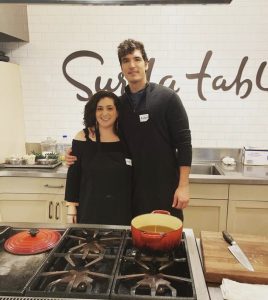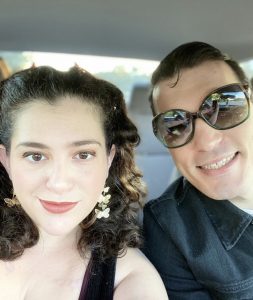This blog has been archived as of 2020.
Click here to read the book inspired by the blog.
I want to thank everyone who followed my journey since I was first diagnosed with POTS/Dysautonomia in 2012. It’s been a long road! One that led me down a lot of miserable days and difficult medical choices. I appreciate all the readers who followed me as I figured out how to survive and thrive with a chronic, invisible illness. I’m even more grateful that chronicling my adventure led to a book deal and I was able to share my story and advice with people all over the world– in a way that is permanent and can act as a guide for any patient, at any point in their journey.
Through this blog I shared what it was like to confront all the unknowns associated with a murky diagnosis: doctors who didn’t believe me, friends and confidants lost, struggles to cope with the pressure of trying to make the right decisions about my care. I also shared all the highs despite my disease: moving out on my own as an adult, getting engaged, then married, the start of my career in advocacy, the excitement of reaching my dreams as an author and journalist.
I talked about the horrors of central lines, struggling with pain management options, and all the co-morbidities and other diagnoses we found along the way. (Gastroparesis, Primary Immune Deficiency Disease, Intracranial Hypertension) And I shared my best advice for each.
Since I’m arching the older posts from this blog I want to narrow it down to a few useful points.
POTS/Dysautonomia
- In my experience, the best treatment for POTS was steady salt intake and hydration. And when I say “steady salt intake and hydration” I mean 8 bottles of Propel on a low-activity day. Ten or twelve on a high-activity day. Salt added to healthy foods and being aware of my dehydration signs (pruned fingers, dry mouth, dizziness, hoarseness when I speak, and fatigue.) It took me literally YEARS to understand just how much fluids I needed to drink to be a functional human being. I almost want to cry thinking about how naive I was assuming I only needed 4-5 bottles of water and a shot of soy sauce a day. No.)
- I am also still, after 8+ years taking a very small dose of beta blockers to manage my tachycardia. Between the fluids, the beta blockers, and regular exercise on a recumbent bike and rowing machine– my cardiac POTS symptoms are essentially non-disruptive to my daily life.
- This is AFTER I went through three central lines and all their ensuing infections. Please avoid central lines unless you are on death’s door. I was and even though I understand that, I still regret it.
- Please check out DysautonomiaInternational.org for great information on managing POTS. I encourage all patients and their families to attend one of their conferences. It is the closest you will ever get to understanding the disease, speaking with the top experts in the world on it, and meeting others who have been there before you. It is worth every expense to get yourself or the patient you care for there.
- And on a last note, I do not endorse the POTS Treatment Clinic in Dallas. It is an over-priced and essentially useless treatment center. You can purchase the biofeedback system they use– Heart Math– online for much cheaper to see if it it will work for you. It did not work for me.
Gastroparesis
- This part of the disease is tricky. I still struggle with it and my weight bounces drastically because of it. I think my management of this part of the disease was at it’s worst when I was living off of Gatorade and Ensure. I wasn’t getting what I needed nutritionally and my tongue was stained with food dye for months at a time (gross.)
- I never really found a nutritionist who was able to get me on a meal plan that I could stick to– because the nature of the disease (at least in my case) was always changing. These days, when I have a bad flare I stick to the basics: rice, protein, and some vegetables I can always seem to handle like cucumbers, avocados, potatoes, and I also eat a lot of fish.
- The only other advice I can give in this area is that I was glad I never got the gastric pacemaker. I was offered it, thought very seriously about getting it for a year, and ended up deciding it wasn’t for me.
- Get checked for endometriosis and abdominal adhesions. I ended up having an exploratory surgery that showed I had excessive amounts of adhesions that were tangling up my organs. Later, I had my gallbladder taken out and the biopsy showed that it had years of scarring. My appendix was strangled by the adhesions and burst, the only reason it didn’t cause sepsis was because it wrapped itself in a bubble of scar tissue. (I mean, lucky? I guess?) And just recently I was diagnosed with endometriosis. So all this to say — there’s a lot of reasons I can’t digest food. Most of them having nothing at all to do with the type of foods I’m eating but the amount of adhesions and inflammation going on in my abdomen at any given time.
Migraines and ICH
- I blogged here for years about my migraines. I tried EVERYTHING. Every drug. Every biologic. Every therapy. I even did Botox. I also sunk into the pit of narcotic pain medication for several years. The pain medication hardly improved my symptoms, caused rebound migraines and made me very depressed. Zero stars. Would not recommend.
- In 2020 I had some abnormalities during a neurological exam and was sent for a spinal tap. My pressure was 30– alarmingly high. I was diagnosed with Intracranial Hypertension. Since I recovered from that spinal type (and it was a doozy!) I have had fewer migraines overall. One big stressor for ICH can be weight gain. I’ve been exercising and eating better to lose weight and reduce the pressure to my skull.
- I’m working with a neurologist now who prescribes me a non-narcotic migraine cocktail for when I absolutely need it.
Primary Immune Deficiency Disease
- I was diagnosed with this in 2009. I did one year of IVIG and one year of Sub-cutaneous immunoglobulins. My condition did not improve with these treatments, so I ended them.
- I’ll always have low levels of IgG, but fortunately for me, they are borderline low. Because of that, I’ve been lucky enough to manage my symptoms with preventative measures and treating with antibiotics when needed.
- In an effort to raise my immunoglobulin levels I quarantined for about five months in 2019– right before the pandemic! Then we went into quarantine and I’m happy/ironically annoyed to say that I haven’t had a single infection since. This is the longest rest my body has had in years and it’s thanking me for it!
- I am cautiously optimistic that with COVID-19, the general transmission of every day infections will go down as we re-integrate into society. Now that the public has a good education about how germs are spread we may have become a safer society for people with these kinds of immune deficiencies.
And as for me… and all the rest?
- RJ and I have been happily married for five years now! (Together 13)
- Happy is still as cute as ever– he is ten years old.
- I work full-time for WEGO Health as their Editorial Director and part of their Patient Leader Network team. I love my job and love that I get to help patients get acknowledge and paid for their contributions to their health communities.
- My mother, Carri Levy, has continued to produce the show she created, Behind the Mystery: Rare and Genetic. It has won a ton of awards and has helped so many rare patients get diagnosed. I am so proud of her!
- My book, Surviving and Thriving with an Invisible Chronic Illness has sold thousands of copies and I am over the moon every time I get to hear from readers!
- I am working on book number two and hope to have it to my agent by Christmas 2020.




Still want more? Keep following my story on Instagram and bookmark my author site to hear updates about my next book.
Love,
Ilana

Ilana, I am just finishing your effective, inspirational kick ass book-thanks. I love your chutzpah ( sp?)I have Lupus and menieres
and vertigo and fibro. I am 70 and have spent years pushing myself while bring ill and undiagnosed).I am a retired organic farmer- hospital hospice Chaplain and therapist and a Mom and grandmother- you are a very wise young woman. Thanks for your exc. advice. You have helped me a lot already. I will be buying your book as gifts to a few of my friends and my adult daughter who has Hashi Motos ( sp?)
Homeopathy has helped me a lot along with prayer and meditation .
Looking forward to your next book. Hugs and prayers and gratitude- Arlene